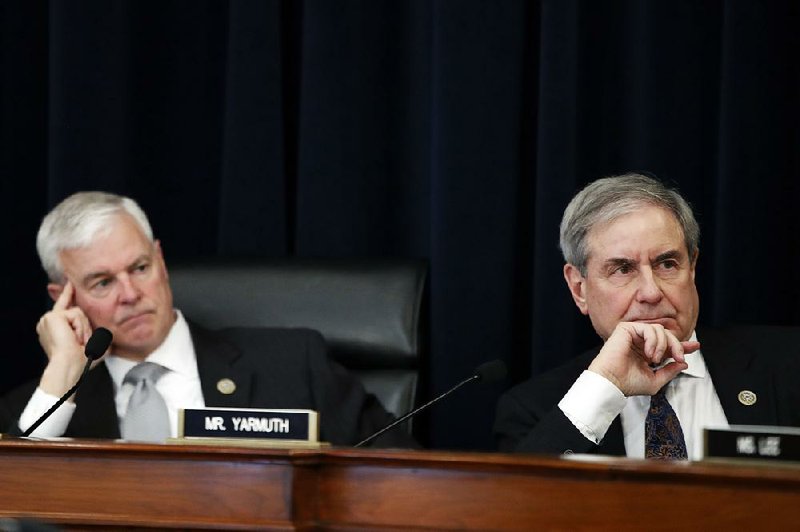WASHINGTON -- In the House Budget Committee on Wednesday, Republicans repeatedly praised President Donald Trump and his fiscal 2019 budget, which envisions $984 billion in deficit spending next fiscal year.
The president, who told Americans in a May 2017 address that he would balance the nation's budget, unveiled a budget blueprint Monday that foresees 10 straight years of red ink totaling more than $7 trillion.
Deficit spending was about $665 billion in fiscal 2017, $80 billion higher than the previous year.
White House budget director Mick Mulvaney -- who was known as a deficit hawk when he served in Congress -- said the budget would have his support if he were still serving on Capitol Hill.
[PRESIDENT TRUMP: Timeline, appointments, executive orders + guide to actions in first year]
"Does it disappoint me that we do not balance in 10 years? It does. Do I think it's a failure because of that? I do not," he said.
The fiscal 2019 budget would allow for $4.4 trillion in spending between Oct. 1 and Sept. 30, 2019.
The White House anticipates 10 years of solid economic growth, low inflation, low unemployment and stable interest rates. If there's a recession or if interest rates soar, the deficits will expand, Mulvaney acknowledged.
Republicans have denounced deficit spending for decades, warning in their 2016 party platform that the nation's fiscal burden "threatens the security, liberty and independence of our nation."
But Mulvaney told lawmakers that balanced budgets aren't attainable, at least in the next 10 years.
Trump's blueprint, Mulvaney said, would slow the growth of government, eliminating trillions of dollars in additional spending that might otherwise occur.
The national debt topped $20 trillion last year.
Last week's budget agreement reached by lawmakers, which increases spending by $320 billion over the next two years, will expand the deficit. So, at least in the near term, will the $1.5 trillion tax cut package that passed in December.
Now the White House is encouraging lawmakers to start making trillions of dollars in cuts.
Committee Chairman Steve Womack, an Arkansas Republican from Rogers, said Trump's budget "emphasizes the need for efficient, effective, and accountable use of taxpayer dollars and takes real steps to target waste, fraud, and abuse in government."
The White House plan "acknowledges fiscal reality and takes significant steps towards reducing the deficit," he added. "The president's budget projects $3 trillion in deficit reduction, including $1.7 trillion in mandatory savings."
Womack spoke approvingly of spending increases for the military, border security and opioid-addiction treatment, but he warned that the nation's financial state is "undeniably grave."
"While there are many worthy policy proposals in this budget request, it's also very telling of our financial situation that the proposal does not get to balance. It should always be the goal to balance our books," he said. "Every year we neglect to do so, the task becomes more daunting and more difficult."
Committee Democrats condemned the proposal, saying it would harm low-income Americans.
U.S. Rep. Sheila Jackson Lee, D-Texas, called it "a morally bankrupt budget."
U.S. Rep. John Yarmuth, D-Ky., said the "irresponsibly extreme" blueprint "reflects a disdain for working families, as well as a disheartening lack of vision for a stronger society. This budget calls for massive cuts to health care, anti-poverty programs, and investments in economic growth -- all to blunt the deficit-exploding impact of the president's tax cuts."
After cutting tax rates for the wealthiest Americans, Republicans are now neglecting the poor, he said.
"Not a single millionaire would have gone hungry without the new tax cuts my Republican colleagues just gave them, but many American families will not be able to put food on the table under this budget. Others wouldn't be able to afford health care or housing or to heat their homes in the winter. These are choices my Republican colleagues are making -- and they are reprehensible," he said.
U.S. Rep. Jodey Arrington, R-Texas, praised Trump for showing leadership on the budget and elsewhere.
"He's a promise keeper, and I appreciate that," Arrington said. "Everything he's made a priority and everything he's promised, he's done."
Asked afterward how he can reconcile $7 trillion in deficit spending with Trump's balanced-budget promise, Arrington said, "I believe that the spirit of what he's saying and what he's promising, he's delivering on."
Although the debt is projected to grow each year of the Trump presidency and beyond, the White House says annual deficits will eventually begin to fall; after peaking at $987 billion in 2020, the yearly deficits are expected to gradually decrease, falling to $363 billion by 2028.
"He's moving us to balance," Arrington said.
Unlike most of his Republican colleagues, U.S. Rep. Mark Sanford of South Carolina expressed skepticism as he reviewed the Trump budget.
"There's a lot of hope that's built into this," he said.
The blueprint data, he said, is "wildly optimistic. And if it's wrong, it's wrong by trillions of dollars. We're not talking billions; we're talking trillions."
Attaining 3 percent annual economic growth for the next decade might be possible, if immigration is doubled or weekends are abolished, he said.
Unless the nation gets its fiscal house in order, a day of reckoning will come, he said.
"I think that we're sleepwalking our way to the largest financial crisis in the history of our country," he added.
A Section on 02/15/2018



